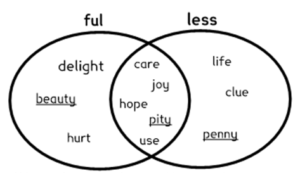22 June 2018
The spellings this week are all plurals. Children need either add an s, add es or drop the y for an ies to make these words into the plural form.
| baby babies |
| cherry cherries |
| lady ladies |
| fox foxes |
| witch witches |
| table tables |
| pencil pencils |
| knee knees |
15 June 2018
There are only five spellings this week. However, children will have to use the words correctly in context to get the spelling correct.
| There are three cows. |
| Their cat is naughty. |
| They’re playing tennis. |
| Our class work hard. |
| Are we nearly there? |
08 June 2018
The spellings this week are homophones and near homophones. Homophones are words which sound the same but have different meanings and often spellings.
| sea see |
| one won |
| quite quiet |
| hear here |
| blue blew |
| night knight |
| bare bear |
| to too two |
18 May 2018
The spellings this week consolidate our suffix learning by testing any eight words from the previous two lists: -ful & -less and -ment & -ness.
11 May 2018
We’re learning about -ness and -ment suffixes in phonics next week. Usually, you just add the suffix on to the root word. The exceptions are when the word ends in a y and is more than one syllable long. Eg. happiness or merriment. Argument is another exception as you drop the e from argue.
| happy happiness |
| sad sadness |
| kind kindness |
| quiet quietness |
| dark darkness |
| punish punishment |
| enjoy enjoyment |
| move movement |
| amaze amazement |
| measure measurement |
04 May 2018
The spellings this week can all have the suffix -ful or –less added to them (some can have both). The underlined words have an extra rule to follow when adding the suffix: drop the y for an i.

27 April 2018
We are looking at the suffixes -er and -est this week. The first four require you to drop the e from the root word before adding the suffix. The last four require you to double up the last letter before adding the suffixes.
| nice nicer nicest |
| large larger largest |
| wise wiser wisest |
| strange stranger strangest |
| thin thinner thinnest |
| big bigger biggest |
| sad sadder saddest |
| hot hotter hottest |
20 April 2018
The spellings this week all use the rule double up for a short vowel sound. They also all end with the suffix ed or ing. The root word is also included in the list.
| to pat patting patted |
| to hop hopping hopped |
| to drop dropping dropped |
| to trap trapping trapped |
| to hum humming hummed |
| to slip slipping slipped |
| to clap clapping clapped |
| to grin grinning grinned |
23 March 2018
The spellings this week are all contracted words. They all have the apostrophe in the same place: instead of the o in not.
| do not don’t |
| can not can’t |
| will not won’t |
| did not didn’t |
| have not haven’t |
| has not hasn’t |
| does not doesn’t |
| must not mustn’t |
| should not shouldn’t |
| could not couldn’t |
| would not wouldn’t |
16 March 2018
The spellings this week are all contracted words. The first four contracted words have the apostrophe after the I.
The rest all use an apostrophe to replace the o in not.
| I am I’m |
| I will I’ll |
| I would I’d |
| I have I’ve |
| do not don’t |
| can not can’t |
| will not won’t |
| did not didn’t |